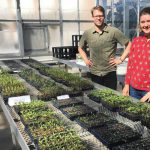2015 International Year Of Soils
The United Nations General Assembly declared 2015 the International Year of Soils (IYS). The Food and Agriculture Organization (FAO) of the UN aims to have IYS be a platform for raising awareness of the importance of soils for food security and essential ecosystem functions. The FAO created the Global Soil Partnership as an umbrella group to carry out IYS activities, and prepare reports and assessments. The Composting Council Research and Education Foundation (CCREF) is a partner with the Global Soil Partnership. In celebration of World Soil Day on December 5, CCREF released a video about the benefits of making and using compost to build soil health and fertility.
Sustainable Solutions To Infrastructure Crisis
During the first half of 2014, the Center for Sustainable Infrastructure (CSI) at Evergreen State College in Olympia, Washington formally interviewed 70 of the Pacific Northwest’s top infrastructure innovators and thought leaders on how to advance a new sustainable infrastructure paradigm and practice in the Pacific Northwest and beyond. The findings were recently released in “Infrastructure Crisis, Sustainable Solutions,” a report authored by Rhys Roth, CSI’s Director. BioCycle is especially excited about the report because it validates a mantra the magazine has been “chanting” for years: We need integrated solutions to tackle today’s infrastructure challenges — solutions that include those provided by organics recycling products and services. In the section titled “What Does the Future of Sustainable Infrastructure Look Like?”, Roth states: “The future of sustainable infrastructure will increasingly blur boundaries between our energy, transportation, water, and waste systems to implement complementary strategies that benefit more than one system. But today, for the most part, our communities’ infrastructure systems are developed and managed separately, by separate utilities and agencies. Among our most important, and difficult, challenges will be reforming these institutions and their funding mechanisms to enable and incentivize integrated, whole-system solutions that benefit our communities the most.”
Roth notes that there is no widely accepted definition today of the term sustainable infrastructure. Therefore in the report, he outlines systems within a “new sustainable infrastructure paradigm”:
Environmentally sound and resilient: Achieves radically improved environmental performance and greater resilience to future disruption risks.
Integrated: Connects across the silos now isolating different systems to deliver better, more efficient services.
Affordable: Demonstrates a strong business case for investment decisions, commit the resources necessary for proper maintainenance, and enjoy reliable, equitable revenue streams from users and beneficiaries.
Rich in cobenefits: Offers a portfolio of important cobenefits of real value to the community for the economy, public health, social equity, the environment, and more.
Beneficial to the local economy: Supports economic and community development by stimulating local investment, growing local capacity in the building industries and trades, and helping promote more broadly shared prosperity.
Fetzer Vineyards Receives Zero Waste Certification
Fetzer Vineyards, based in Hopland, California, received platinum level Zero Waste certification from the U.S. Zero Waste Business Council (USZWBC), the highest level of certification offered. Fetzer has successfully diverted 97.7 percent of its waste from landfill, incineration and the environment through recycling, reusing and composting, while also focusing on Zero Waste leadership, preventing waste upstream, and the triple bottom line. “Our certification program holds to the highest standards and is one of the toughest in the country, so reaching the platinum level is a great accomplishment,” says Stephanie Barger, founder and executive director of USZWBC. “Fetzer Vineyards has been a long time partner of the Zero Waste movement. Recognizing and documenting Fetzer’s achievements beyond recycling to reduce, retrain and redesign systems increases its bottom-line and motivates other companies to take the next step.”
Additional achievements by Fetzer include: Diverted approximately 2,807 tons of total waste from landfill in 2013; Composted 3.6 million pounds of grape skins, stems and seeds in 2013, incorporating the compost into its vineyards as fertilizer; Became the first winery in California to operate on 100 percent renewable energy in 1999; and Saved more than $388,000/year from disposal costs and including revenue for recycling.
Organics Recycling Grows In Scotland
In December 2014, Zero Waste Scotland released A Survey of the Organics Reprocessing Industry in Scotland 2013, which details the volume of organics recycled in Scotland in 2013. According to the document, the volume of organics diverted from the landfill increased considerably between 2012 and 2013. This increase occurred prior to the introduction of Waste (Scotland) regulations on January 1, 2014 that require businesses producing more than 110 pounds (lbs) (50 kg)/week of food waste to source separate that material for separate collection. The same regulations require businesses producing more than 11 lbs (5 kg)/week of food waste to source separate that material for separate collection by January 1, 2016.
Significant findings highlighted in the report include: Total amount of organics being processed by anaerobic digestion (AD) in Scotland increased from 133,380 tons in 2012 to 145,505 tons in 2013, an increase of 12,125 tons (9 percent); Amount of organic material diverted to composting facilities from food manufacturers/processors increased from 2,205 tons in 2012 to 41,888 tons in 2013; Amount of organic material sent from local authorities to AD plants in Scotland increased by 13,228 tons from 2012 to 2013; and Employment in the Scottish AD sector increased 13 percent between 2012 and 2013. Iain Gullard, Chief Executive of Zero Waste Scotland, believes the findings of the report show promise for the organics recycling industry in Scotland, especially with residential organics diversion. “One of the biggest increases was in food waste coming from local authorities,” states Gullard. “Thanks to Zero Waste Scotland’s support, more Scottish households than ever before — 1.3 million — now have access to food waste collection, and we would expect this, together with the impact of the waste regulations, to have a significant impact on the industry going forward.”










